
Born in Tullymet in rural Saskatchewan, Ivan Eyre began his formal art education as a high school student at Saskatoon Technical Collegiate, where he studied under artist and teacher Ernest Lindner from 1950 to 1953. He recounts, “Knowing that there was somebody seriously committed to art, somebody who had made it his life's work, was encouraging. [Lindner's] influence in this regard was important." While finishing high school, Eyre also enrolled in night courses at the University of Saskatchewan, where he studied under Eli Bornstein. Eyre later earned his Bachelor of Fine Arts at the University of Manitoba in 1957, and briefly continued his studies at the School of the Art Institute of Chicago.
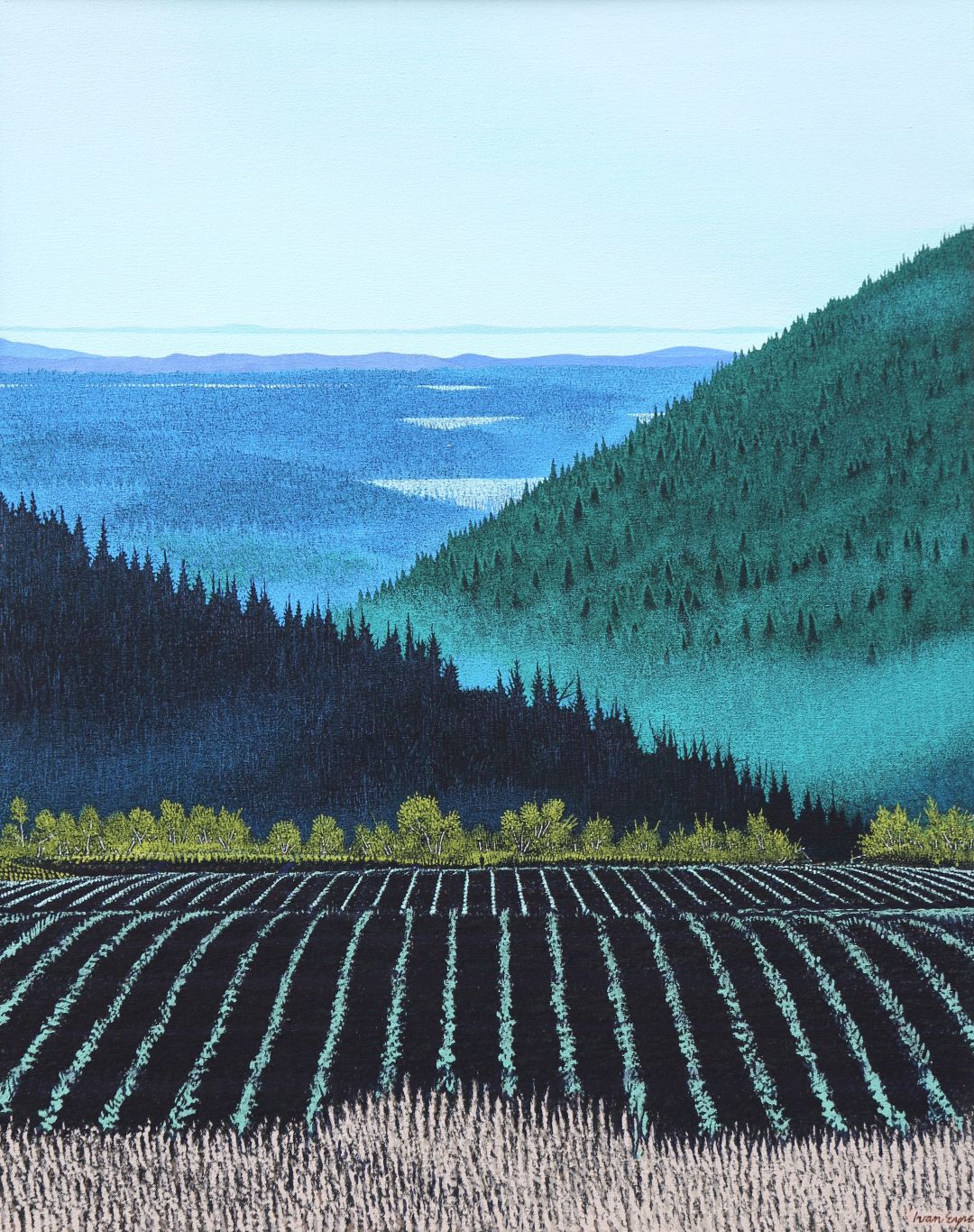
Field Pass, 2001, acrylic on canvas by Ivan Eyre
Ivan Eyre studied under artists Wynona Mulcaster and George Swinton during his undergraduate years. While still a student, he exhibited pieces at the Winnipeg Art Gallery, where his work caught the eye of gallery director Ferdinand Eckhardt, who became an early supporter. In 1956, Eyre was awarded the Winnipeg Art Gallery Scholarship in recognition of his artistic accomplishments. Around the time he completed his degree, he married Brenda Yvonne Fenske, a fellow student at the University of Manitoba.
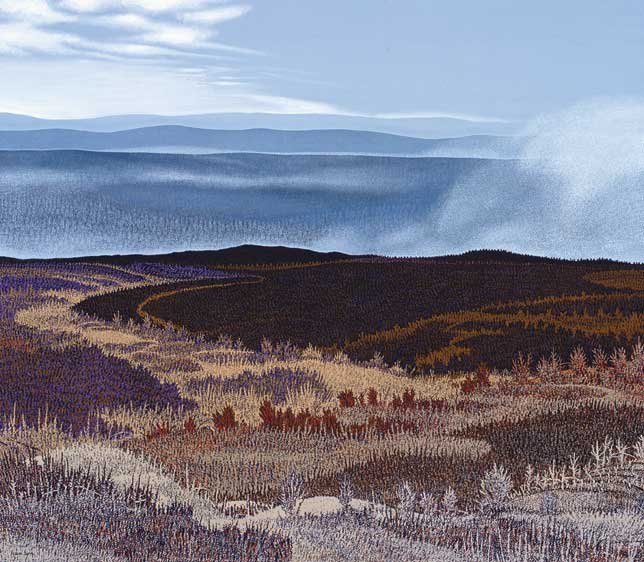
Umber Knoll, 2002, acrylic on canvas by Ivan Eyre
In 1958–1959, Ivan Eyre pursued graduate studies at the University of North Dakota in Grand Forks, where he also worked as a graduate assistant. During this time, he began experimenting with sculpture, including his first carved wooden head, now held in a private collection in Ottawa. Immersed in a vibrant period of the American art scene, Eyre’s painting style began to reflect the influence of major modern artists such as Willem de Kooning, Arshile Gorky, Joan Miró, and Max Beckmann.
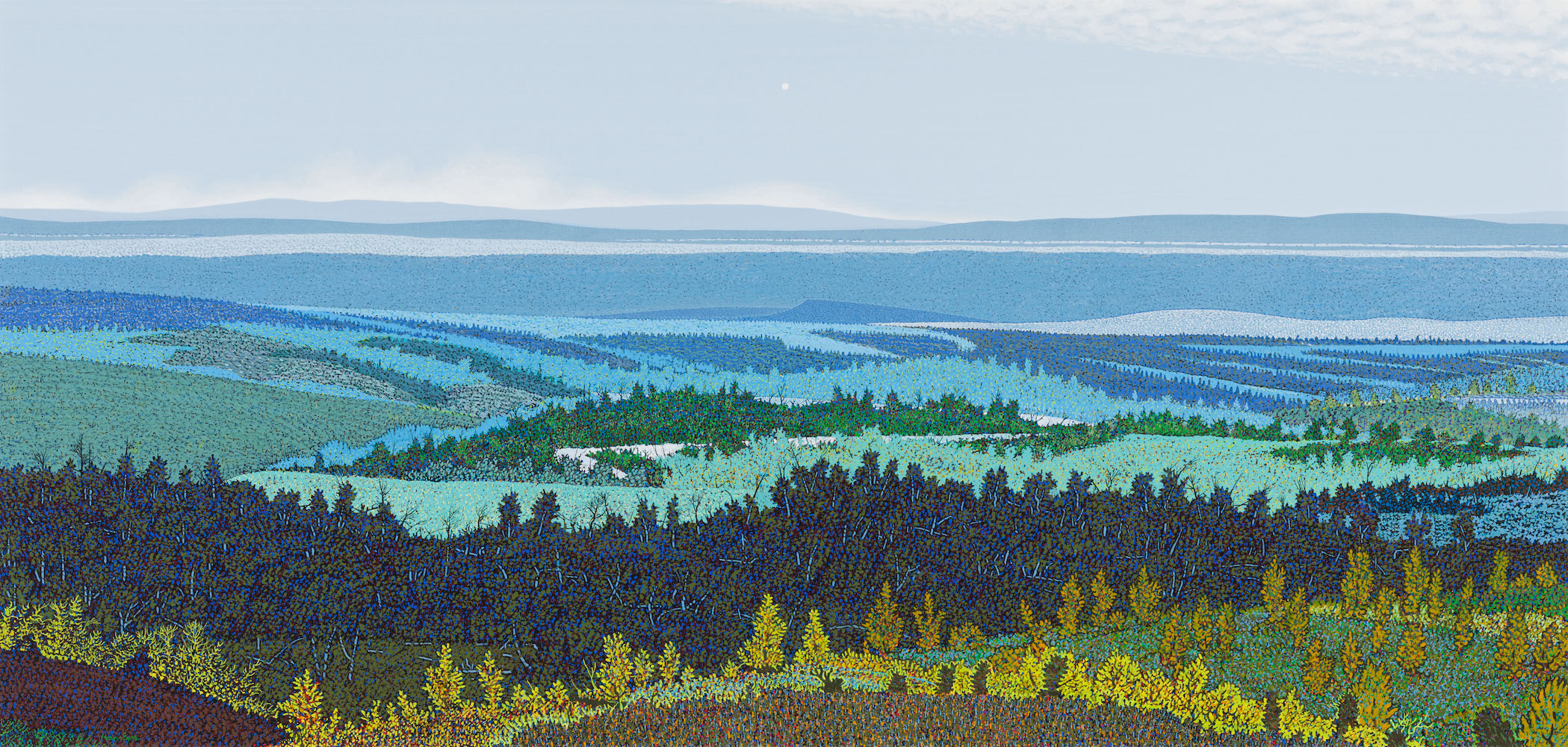
Ravine Hills, 2003, acrylic on canvas by Ivan Eyre
In 1959, due to financial struggles, Eyre and his wife returned to Winnipeg, where he accepted a part-time teaching role at the University of Manitoba’s School of Art. For a year, he instructed painting and drawing classes in Brandon and Neepawa. He secured a full-time teaching position as a Professor of Painting and Drawing 1960 which he held until retiring in 1992.
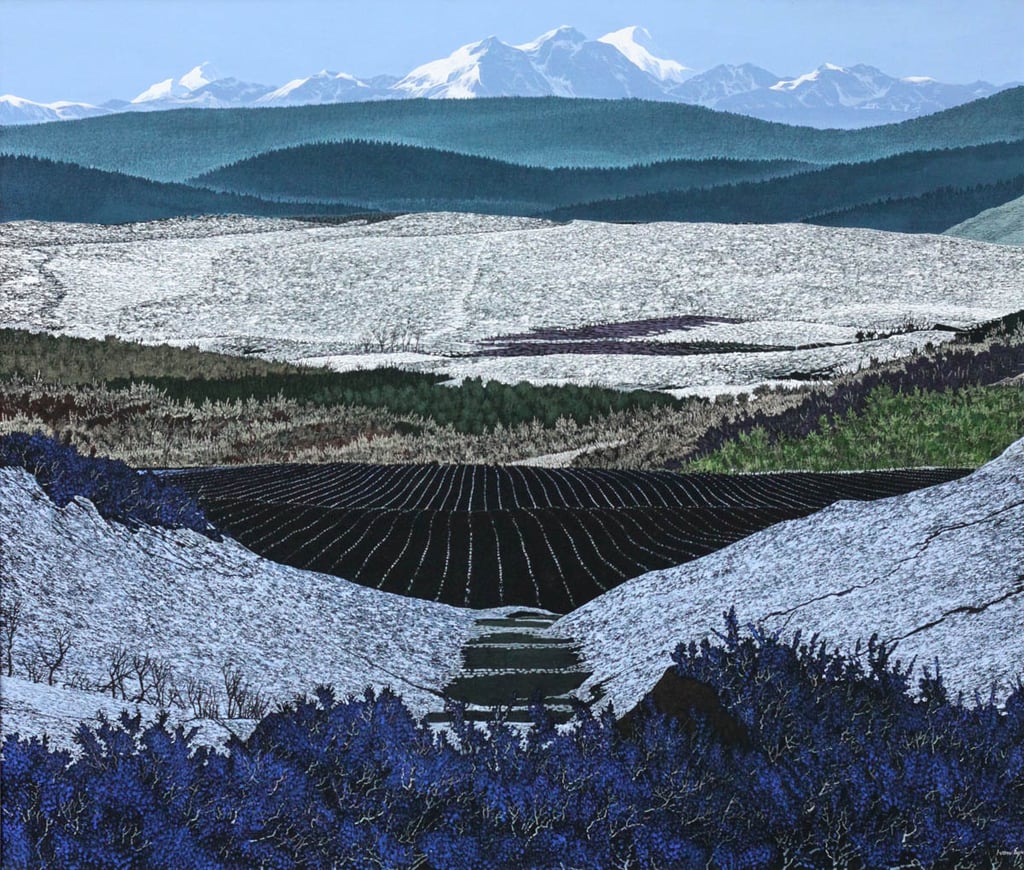
It was during these years that Eyre began to develop his personal style. Reflecting on the early 1960s, he recalled, “I began to reevaluate my work and decided to begin afresh....I worked at ridding myself of all influences.”
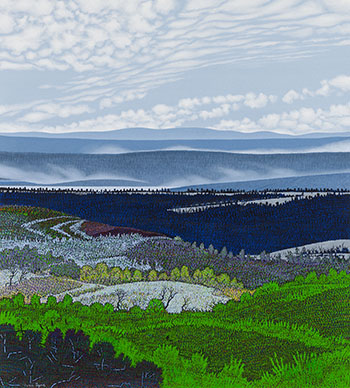
Cloud Rows, oil on canvas by Ivan Eyre
Eyre’s landscapes are known for being large, expansive, figure-free and panoramic, whereas his figurative pieces and introspective still lives are carefully arranged to create depth and layered space. His landscapes often depict gently rolling, forested hills seen from an elevated perspective with narrow skylines. While influenced by the scenery of Saskatchewan and Manitoba, these paintings are ultimately products of his imagination. He moved away from strict realism, choosing instead to create “invented landscapes”, dreamlike spaces that reflect memory and emotion rather than precise geographic detail.
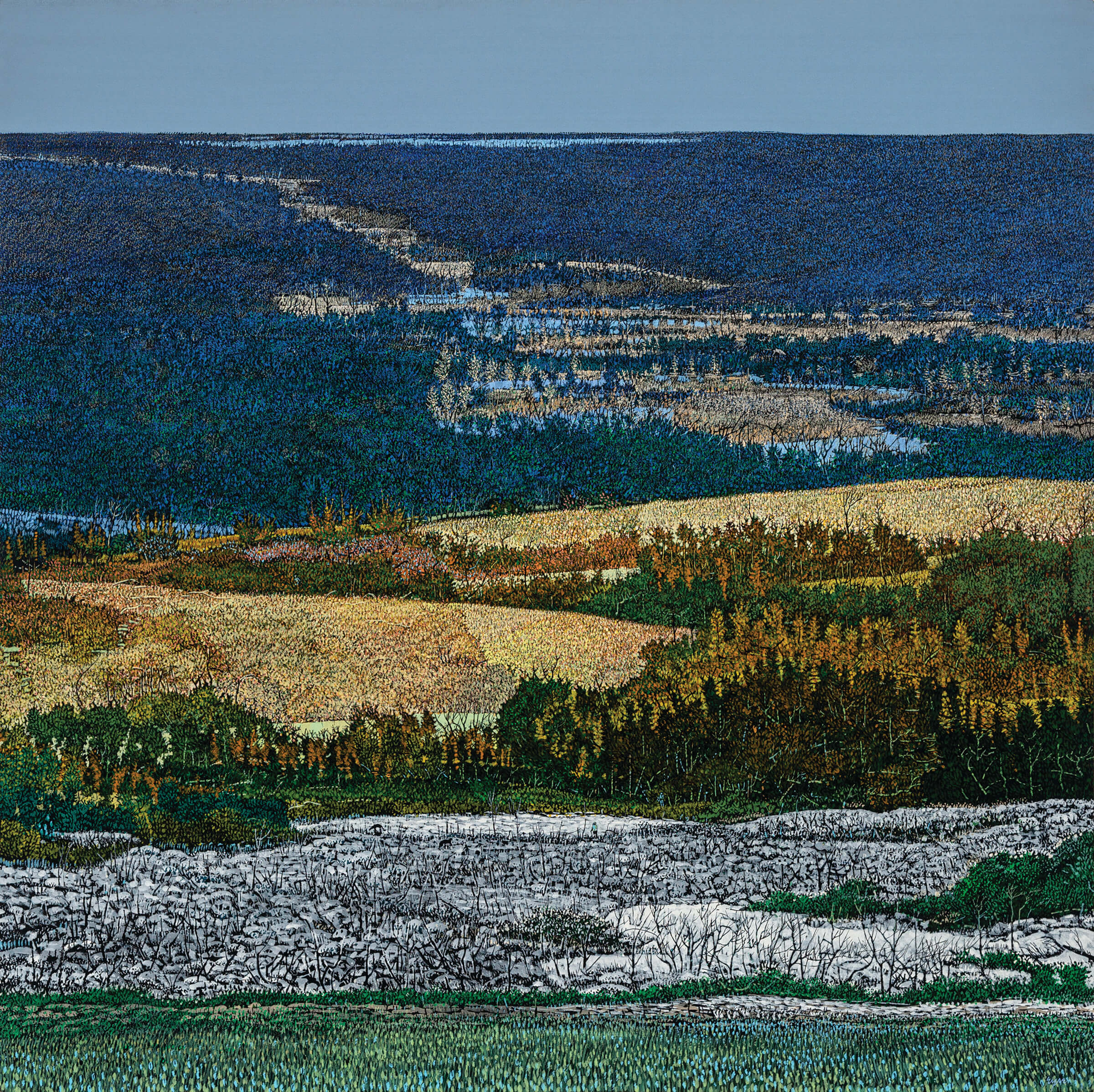
Asessippi, oil on canvas by Ivan Eyre
Art historian Joan Murray is quoted as saying “[Eyre's art] has, to a degree unusual in Canadian art: a pervading sense of stillness and calm." She also discussed that Eyre’s art is expressive, and that his oeuvre shows his imagination, memories, and his view of the world.
Regarding his paintings, Eyre said, “…something less than a full understanding of a work is desirable in that it allows the painting to keep giving. A complete understanding would signify that we don't have to think about it anymore. Some mystery should remain, compelling viewers back to the paintings...possibly to reaffirm themselves.”
Rose Country, acrylic on canvas, by Ivan Eyre
Other works with surrealist elements include recurring motifs such as foreshortened reclining nudes, silhouetted figures, horses, flying creatures, machines, Brutalist architecture, and imagery related to war. Eyre does not subscribe to the idea of artistic “schools” or “movements,” whether defined by critics or fellow artists. Placing the individual artist’s vision above all, he has criticized movements like the avant-garde for limiting creativity, forcing artists to conform to a prescribed style or approach.
Throughout his career spanning over 50 years, Eyre received numerous honours and awards, including election to the Royal Canadian Academy of Arts (1974), the Order of Manitoba (2007), and the Queen’s Gold and Silver Jubilee medals. He was also awarded an honorary Doctor of Laws from the University of Manitoba, received several grants, and became the subject of multiple films and over five books. In 2015, he was appointed a Member of the Order of Canada in recognition of his contributions to Canadian art. Major retrospective exhibitions of his work have been held at institutions such as the Winnipeg Art Gallery. His work has been featured in over 65 solo shows and more than 250 group exhibitions throughout Canada.
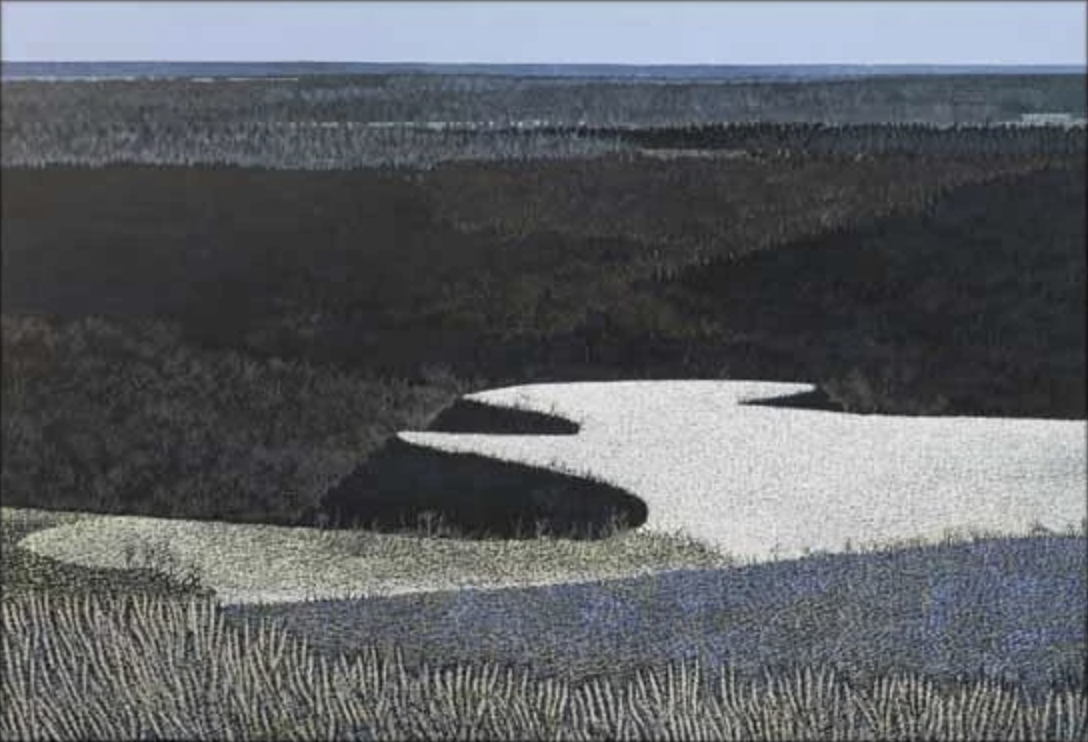
Uplands, 1981, acrylic on canvas by Ivan Eyre
Eyre’s paintings and drawings are included in the collections of the National Gallery of Canada, the McMichael Canadian Art Collection, the Art Gallery of Ontario, and many other public and private collections across the country.
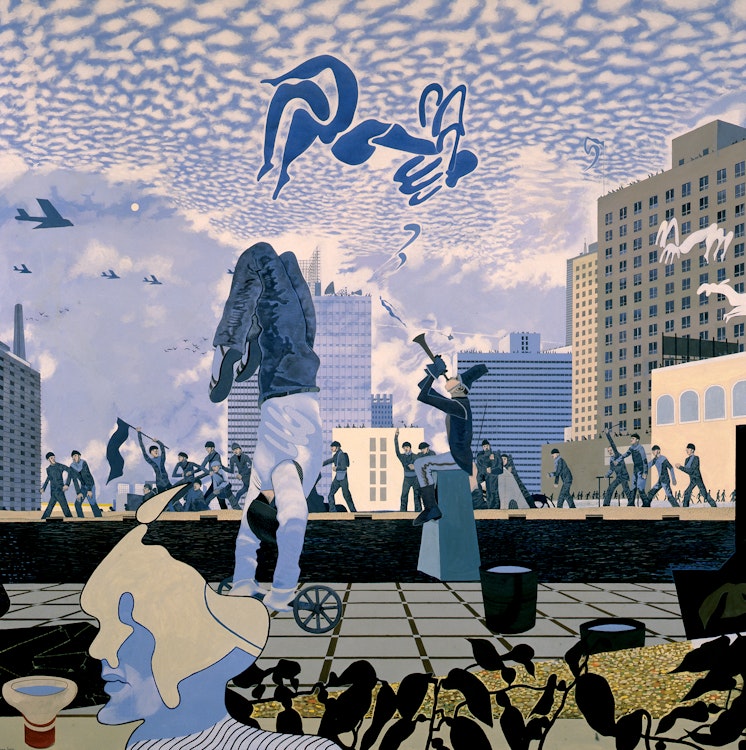
Canal Square, 1992, acrylic on canvas by Ivan Kenneth Eyre
Consignment at Rookleys
At Rookleys Canadian Art, we are actively seeking works by Ivan Eyre for consignment, offering consignment rates far lower below what auction houses charge. If you have a Eyre painting to consign, please contact us at info@rookleys.com to discuss these opportunities further.
"UM Mourns passing of Ivan Eyre". University of Manitoba.
Reeve, Gordon. "Ivan Eyre, LL.D., May 27, 2008". University of Manitoba. Archived from the original on 6 October 2017.
Murray, Joan (1980). Ivan Eyre: Exposition. Oshawa: The Robert McLaughlin Gallery.
Ivan Eyre: Exposition. Oshawa: The Robert McLaughlin Gallery. 1980.
"Rusting Hulk in White Snow: Winnipeg: Joan Murray Talks with Ivan Eyre". Descant Vol. 10, no. 2 (1979), p. 145.
"Ivan Eyre Gallery". assiniboinepark.ca. Assiniboine Park. Archived from the original on 6 October 2017.
"Members since 1880". Royal Canadian Academy of Arts. Archived from the original on 26 May 2011.